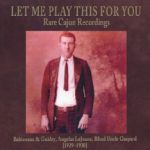
Various Artists - Let Me Play This For You: Rare Cajun Recordings 19 [Tompkins Square - 2013] |
Tompkins Square have unearthed another archive of rarity; this time specific almost to the point of absurdity. This detailed release, with informative booklet, contains recordings of cajun music in south-western Louisiana, from 1929 and 1930 - like I said, specific… This brief snapshot of history, rescues these recordings from the forgotten, cobwebbed realms they have been unfairly condemned to: you may recognise the compilation dates as the period of the Great Depression in the USA, and as a consequence, these recordings sold very badly. Thus, despite being very well considered in their own time, and indeed by cajun music devotees ever since, the featured artists have been largely invisible in the wider domain. So, “Let Me Play This For You…” collects up these rare vinyls, dusts them down and introduces us to Angelas LeJeune, Percy Babineaux & Bixy Guidry and Blind Uncle Gaspard & Delma Lachney. Angelas LeJeune’s claim to history, despite his own undeniable skills with accordion and voice, is that he was the great-uncle of Iry Lejeune - a legendary musician, often considered the finest Cajun accordionist. Thus he would have been an incredible shaping influence and inspiration for the younger Iry, practicing together as they did. However, in his own time, the elder LeJeune (a tenant farmer) was considered to be a fine player; and indeed made his initial recordings as a result of winning a statewide accordion contest in September, 1929. On these, and later recordings, he would be backed by Ernest Fruge and often supported by Dennis McGee - both on fiddles. This combination of accordion, fiddles and vocals, made for very sprightly, swirling tracks; though often founded on a pulsing, chugging accordion bass line. Most of the songs feature Lejeune playing and singing over a bed of freewheeling fiddle playing; often stopping to sing in his raw, yearning voice, whilst the fiddle (or fiddles) spirals behind him. Sometimes, this takes on an almost shamanic call-and-response atmosphere. The ensemble passages of playing, are often articulate and intricate; with twirls and flourishes that remind the ear of gipsy and middle-eastern musics (“La Valse Du Texas”, for example). Indeed, the music I hear from this era is so often guitar-based, that to hear more lithe instruments, skipping and racing around each other, is an interesting experience. When playing songs at a slower pace - “Valse De Pointe Noire”, for example - LeJeune and company take on an almost stately, or courtly, tone. There’s a grandeur, a dramatic bearing; which is tempered by the raw, earthy informality of the recordings. At the other extreme, we have “One Step A Cain”; which comes across as some ancient predecessor of techno (etc) - rigid, rhythmic accordion pulsing, backed by equally spartan minimalist fiddle: its like some kind of hoedown for Minimalist composers.
A few miles down the road from LeJeune’s Church Point, were Cankton and Carencro - homes to Bixy Guidry and Percy Babineaux respectively. This duo, on accordion/vocals and fiddle, remain largely obscure figures to us; but they recorded eight sides for the Victor Talking Machine Co., in New Orleans on November 6, 1929. These pieces are stylistically similar to Angelas LeJeune, with accordion and fiddle shadowing and snaking around each other. Again, there is the stately tone of the slower songs; but unlike LeJeune, they rarely play at more breakneck speeds. The call-and-response form is equally evident with Guidry and Babineaux; but sometimes the “shamanic” quality is even more pronounced - on “La Valse Du Bayou”, Guidry’s vocal exclamations take on a near-religious tone of evocation and praise. On the whole though, the duo are perhaps a little more sedate and mournful than the LeJeune recordings - though “I Am Happy Now” is perhaps an even more concentrated burst of “techno precedent” than “One Step A Cain”: a curiously coloured, often discordant, rhythmic charge; reminiscent of the “train song” tradition.
Finally, from further north, we have two pieces from Alcide “Blind Uncle” Gaspard; a guitarist from Avoyelles Parish. He played in a guitar/fiddle duo, with Delma Lachney; and “Let Me Play This For You…” has an instrumental track from this pairing and a solo recording from Gaspard. The duo song, “Baltimore Waltz” is a quietly pretty little piece; somewhat understated and warm - the fiddle tenderly playing the main melody over Gaspard’s strummed chords. “Marksville Blues”, performed by Gaspard, is a laid-back song for guitar and vocals - almost lazy, nearly eerie. There’s an introspective air to the vocals; not exactly world-weary, but devoid of bluster or histrionics. Coming right at the end of the compilation, its a nice, meditative finish to the album - as well as a point at which to reflect on the predominance of the guitar, in our general notion of old folk recordings.
This is not an album which grabbed me initially, but the more I listened, the more I become interested. I knew nothing about cajun music before hearing this, and I can’t pretend to know much more having heard it, but its definitely an area I want to explore more. The mere difference of the music being dominated by accordion and fiddle - as opposed to guitar - gives it a different flavour and potential to the old blues recordings I’m more familiar with. The extended passages of instrumental playing are often quite entrancing and intense, and coupled with the fact that all the vocals are sung in Cajun French, it all adds up to a very colourful album. The recordings themselves can be a little raw and noisy, but they’re entirely acceptable and clear - if anything, the dirt often adds to the accordion sound. Another worthy addition to the Tompkins Square catalogue…
      Martin P Martin P
|

